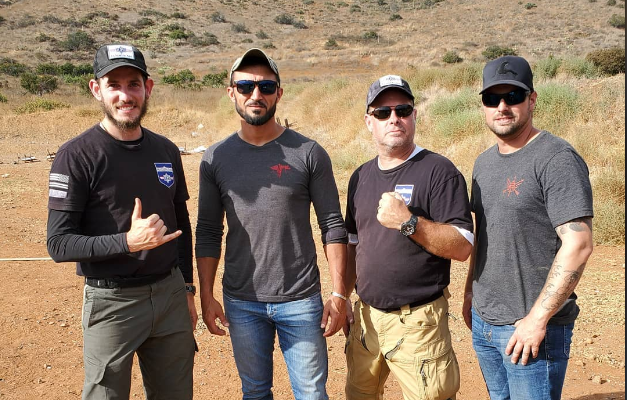
Magen Am, or “Nation’s Shield,” steps up to protect the Los Angeles Jewish community when the going gets tough.
Throughout the past two weeks, protests and riots have taken over the streets of Los Angeles. From Sunset Boulevard to Hollywood Boulevard, people were tearing apart businesses, including many owned by Jewish citizens.
While the Black Lives Matter protests were mostly peaceful, thousands of people used it as an excuse for looting. Shocking scenes took over social media, with many synagogues and Jewish establishments having no protection.
That changed thanks to Magen Am, which translates to “Nation’s Shield.” The security organization is “predicated on the strength of teamwork and fueled by the dedication and commitment of our members,” and that was no exception during the riots last week.
In conversation with United with Israel, Rabbi Yossi Eilfort, a Mixed Martial Arts fighter and director of Magen Am, discussed his organization’s mission and why it’s especially needed in today’s climate.
How did Magen Am first start?
“Magen Am first started when a then-stranger reached out and asked if I could help write a program to begin teaching self-defense to rabbis. Over time, we bridged the gap from self-defense to security, and just continued striving to improve.”
Why is it so important for Magen Am to provide enhanced security?
“Mumbai, Pittsburgh, Poway, Monsey… I think it’s obvious that this needs to happen for the Jewish community, and it must be an internal effort.”
How many volunteers does Magen Am have?
“Not enough.”
Last week, throughout the LA riots, Magen Am went above and beyond. What efforts did you make throughout the week?
“It was really incredible to see our teams step up over the course of the protesting and riots. Our programming has been designed around in-place security and at the shuls. While our licensing, and much of our training, is equally applicable to both scenarios, there was a lot of work from an organizational standpoint to enable us to begin responsibly carrying out a patrol/response program.
“From working out the best methods to keep in accordance with regulations to logistically getting teams out and shifts covered. Thankfully, the riots were heaviest in the beginning and quickly quieted down.
What changed for you from the start to the end of the week as the riots intensified?
“Well, we got more tired. But we also began spending more time supporting the Los Angeles Police Department and National Guard as things relaxed. There were fewer people on the street, but more officers, so we would break up our shifts bringing them cold drinks. Working in line with their recommendations is very important to us.”
You offer training for houses of worship, Chabad shluchim (emissaries) and other important programs. What is the response of people who participate in these programs?
“It’s often difficult to get people to sign up, but once they do, almost everybody enjoys training. Most people don’t realize that there are whole worlds of information in the different fields of training. The biggest thing we teach is communication — probably why we were able to deter and deescalate every call that came in this week — which really can benefit everybody.”
How important is it for synagogues to have this type of training?
“Personally, I think it is critically important. There are many wonderful training organizations out there. It’s important to look at the whole picture: Preparation/planning, different types of emergency situations, and stages of recovery.
“We learned from the Poway attack how important it is to have a plan for security, but also mental health treatment, babysitting, meal trains, insurance… simple activities become incredibly difficult, and it takes the broader community to help with the recovery. For us, the licensing and legal ability to act as security is a most critical piece that cannot be overlooked.”
Is the organization living up to its name?
“I think it’s quite simple. We are there to offer layered protection, made up of the community (nation), but we are not just a ‘guard.’ A shield requires the one seeking defense to hold it up. We’ve provided the community with an ability to protect itself.”
(United with Israel).